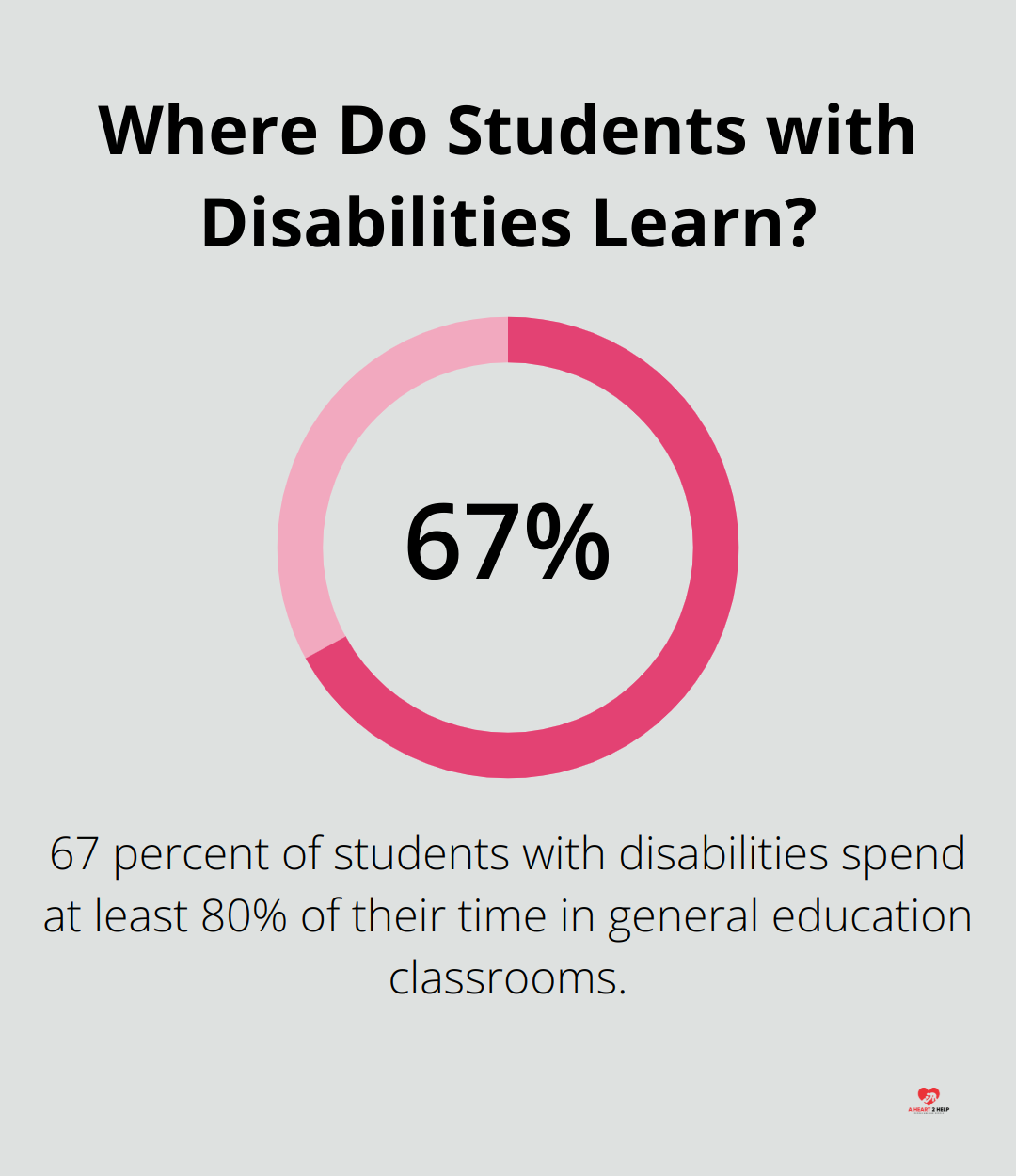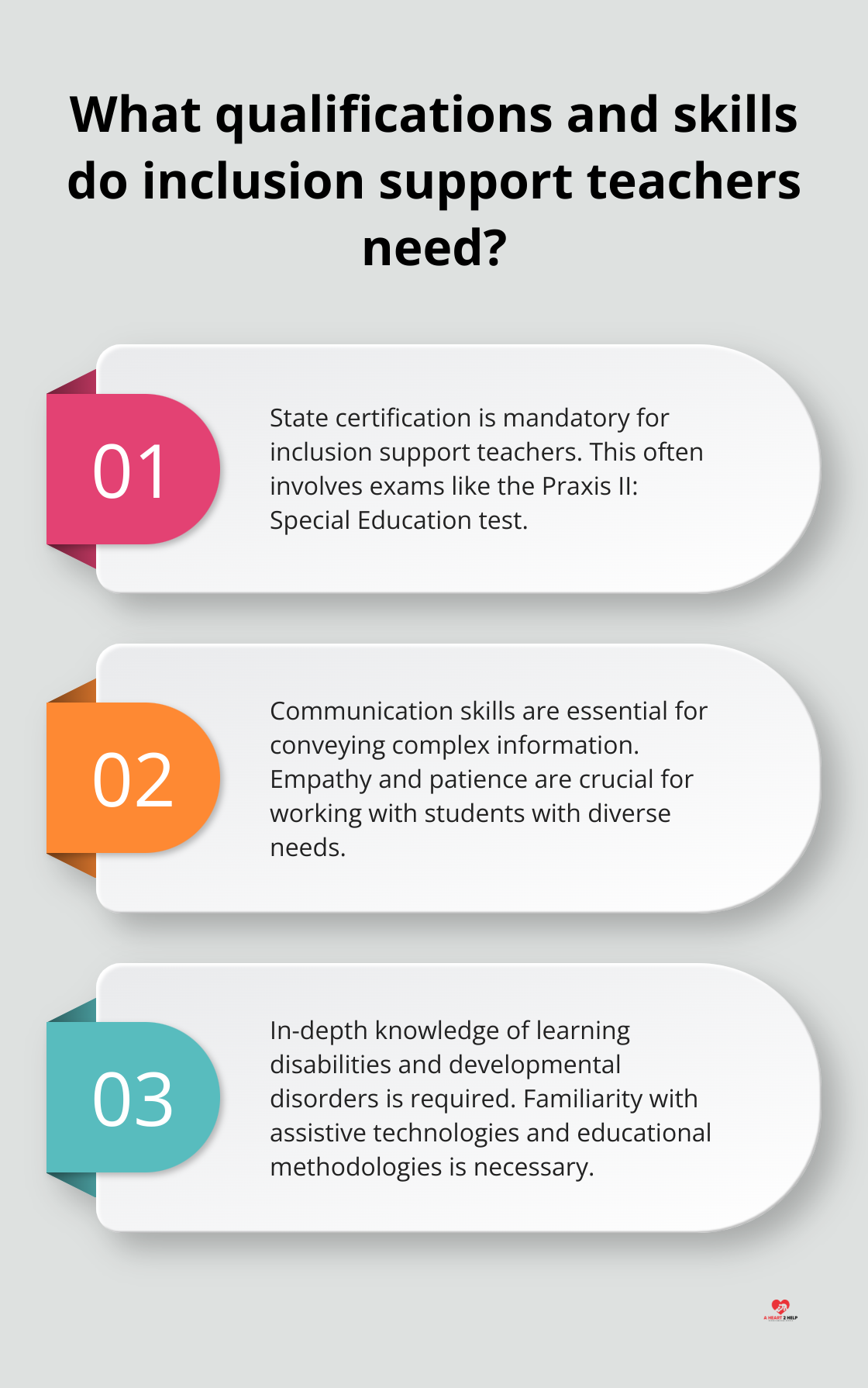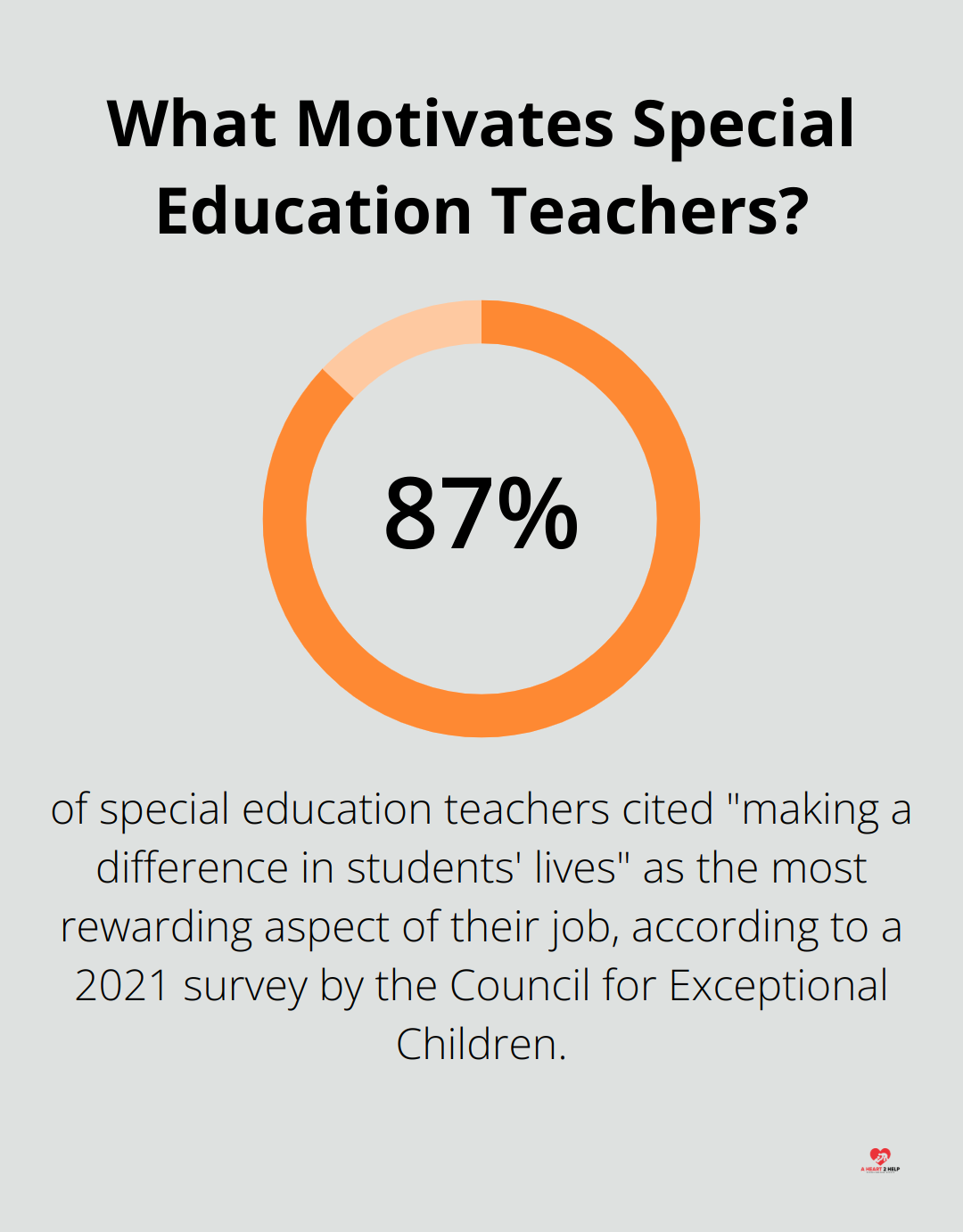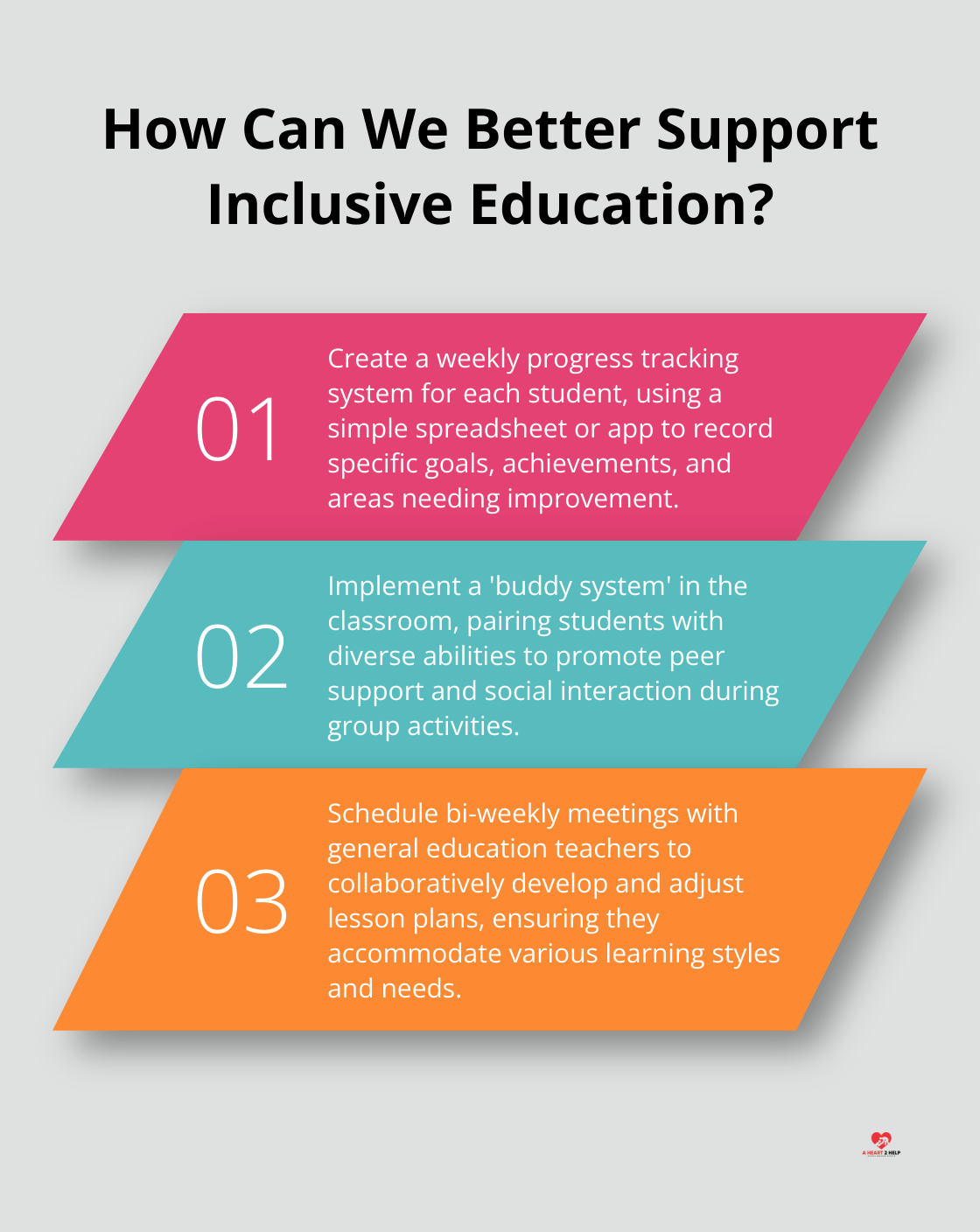Inclusion support teachers play a vital role in modern education. These dedicated professionals ensure that students with diverse needs receive the support they need to thrive in mainstream classrooms.
At A Heart 2 Help, we recognize the immense impact these educators have on students’ lives. In this post, we’ll explore the responsibilities, skills, and challenges of inclusion support teachers, shedding light on this rewarding career path.
What Do Inclusion Support Teachers Do Daily?
Tailoring Support for Individual Students
Inclusion support teachers serve as the backbone of modern classrooms. They dedicate their efforts to ensure every student, regardless of abilities or challenges, has an equal opportunity to learn and thrive. Their daily responsibilities require a unique blend of skills and dedication.

At the core of an inclusion support teacher’s role is the provision of personalized assistance to students with diverse needs. This support might involve one-on-one work with a student who has dyslexia, helping them develop reading strategies, or aiding a child with autism to navigate social interactions during group activities. The National Center for Education Statistics reports that 67 percent of students with disabilities spend at least 80% of their time in general education classrooms, underscoring the critical need for this individualized support.
Collaborating with Classroom Teachers
Inclusion support teachers do not operate in isolation. They function as integral team members, working closely with general education teachers to modify curriculum and create inclusive learning environments. This collaboration often involves co-teaching, where both educators lead the class together, or providing suggestions for adapting lessons to accommodate different learning styles. A comprehensive study by Abt Associates (evaluating over 280 studies from 25 countries) found that these inclusive educational settings lead to stronger math and reading skills for all students.
Creating and Implementing IEPs
One of the most important tasks for inclusion support teachers is the development and implementation of Individualized Education Programs (IEPs). These legally binding documents outline specific learning goals and support strategies for students with disabilities. The creation of an effective IEP requires careful assessment of a student’s strengths and challenges, collaboration with parents and other educators, and regular review and adjustment. The Individuals with Disabilities Education Act (IDEA) mandates that students with IEPs must receive education in the least restrictive environments, further emphasizing the vital role of inclusion support teachers.
Continuous Progress Monitoring
Inclusion support teachers constantly assess and adjust their strategies. They use various tools and techniques to monitor student progress, from formal assessments to daily observations. This ongoing evaluation allows them to quickly identify when a student struggles and adjust their support accordingly. It’s a dynamic process that requires flexibility and a deep understanding of each student’s unique needs.
The work of inclusion support teachers not only benefits the students they directly support but also enriches the entire classroom environment, fostering understanding and acceptance among all students. As we move towards more inclusive educational settings, the role of these dedicated professionals becomes increasingly important in shaping a more equitable future for all learners. The next section will explore the specific skills and qualifications required to excel in this challenging yet rewarding profession.
What Skills Do Inclusion Support Teachers Need?
Educational Requirements and Certifications
Implementing inclusion education involves providing an appropriate education for all students, including those with special educational needs and disabilities. State certification is mandatory, often involving exams like the Praxis II: Special Education test.

Professional development remains essential in this field. The Council for Exceptional Children offers valuable resources designed to help special education professionals sharpen their thinking and improve their practice.
Essential Soft Skills for Success
Formal education provides a foundation, but certain soft skills prove indispensable for inclusion support teachers. Communication skills top the list. These educators must convey complex information to students, collaborate with general education teachers, and engage with parents and administrators effectively.
Empathy and patience are equally important. Working with students who have diverse needs can challenge even the most experienced teachers. Progress often comes in small increments, requiring the ability to celebrate minor victories and maintain a positive attitude (crucial for both teacher and student success).
Specialized Knowledge and Strategies
Inclusion support teachers must possess in-depth knowledge of various learning disabilities, developmental disorders, and effective support strategies. This includes understanding conditions such as dyslexia, autism spectrum disorders, ADHD, and physical disabilities.
They need to stay updated on the latest assistive technologies and educational methodologies. Familiarity with text-to-speech software, alternative communication devices, and specialized learning apps (to name a few) can significantly enhance their ability to support students effectively.
Proficiency in developing and implementing Individualized Education Programs (IEPs) is another critical skill. This involves creating comprehensive plans and adapting them as students’ needs evolve.
Adaptability and Continuous Learning
The field of special education constantly evolves, requiring inclusion support teachers to adapt to new methodologies and technologies. They must embrace a mindset of continuous learning, attending workshops, conferences, and pursuing additional certifications to stay at the forefront of best practices in inclusive education.
As we explore the multifaceted skill set required for inclusion support teachers, it becomes clear that this role demands a unique combination of education, experience, and personal qualities. In the next section, we’ll examine the challenges and rewards that come with this impactful profession.
Here’s the modified chapter with the requested changes:
The Daily Challenges and Triumphs of Inclusion Support Teachers
Juggling Multiple Needs Simultaneously
Inclusion support teachers face a unique set of challenges in their daily work. They navigate a complex landscape of diverse student needs, classroom dynamics, and administrative requirements while creating an inclusive and supportive learning environment.

One of the primary challenges for inclusion support teachers is the management of diverse needs of multiple students within a single classroom. The National Center for Education Statistics reported in 2022 that the average student-to-teacher ratio in public schools is 16:1. For inclusion support teachers, this often means addressing the needs of several students with varying disabilities or learning challenges at the same time.
Using ideas from Universal Design for Learning with all students can make classrooms more welcoming for those with learning disabilities. This approach allows teachers to address individual needs while maintaining overall classroom engagement.
Fostering Inclusive Classroom Dynamics
Balancing individual attention with group dynamics presents another significant challenge. Inclusion support teachers must ensure that students with special needs receive adequate support without feeling singled out or isolated from their peers. This requires a delicate balance and creative teaching strategies.
The use of cooperative learning groups proves effective in this regard. Inclusion support teachers carefully structure these groups to include students of varying abilities, which promotes peer support and social interaction while still providing necessary individualized assistance. Students with disabilities are more engaged in classroom activities where cooperative learning structures are in place compared to more traditional classroom settings.
Celebrating Progress
Despite the challenges, inclusion support teaching offers unique rewards. One of the most significant is the opportunity to witness and celebrate student progress (no matter how small). For many students with special needs, achievements that might seem minor to others can represent significant milestones.
Building Meaningful Relationships
Building meaningful relationships with students and their families is another rewarding aspect of the job. These connections often extend beyond the classroom, with inclusion support teachers becoming trusted advocates and sources of support for families navigating the complexities of special education.
A 2021 survey by the Council for Exceptional Children found that 87% of special education teachers cited “making a difference in students’ lives” as the most rewarding aspect of their job. This sentiment is particularly strong among inclusion support teachers, who have the unique opportunity to see their students thrive in mainstream classroom settings.
Final Thoughts
Inclusion support teachers transform modern education by creating inclusive learning environments where every student thrives. Their expertise and compassion profoundly impact students with diverse needs, helping them overcome challenges and reach their full potential. These educators foster belonging, build self-confidence, and equip students with essential life skills.

The path of an inclusion support teacher demands a unique blend of skills, knowledge, and personal qualities. However, the rewards are immeasurable (witnessing student growth, celebrating achievements, and making lasting differences). Those considering this career have the power to shape the future of education and positively influence countless students’ lives.
At A Heart 2 Help, we value community support and inclusivity. Inclusion support teachers embody these values daily in their classrooms, creating supportive communities that foster empathy, kindness, and mutual understanding among students. Their work extends beyond the classroom, influencing families, schools, and entire communities.

